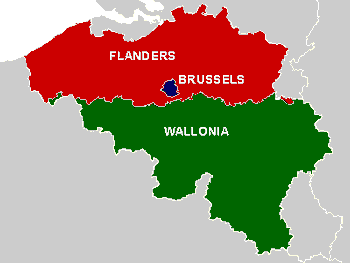
The Republic of Wallonia? It sounds like a made-up Marx brother’s country. Isn’t Flanders a character in The Simpsons? Suddenly, after 175 years of nationhood, the only thing holding these two regions together are the “waves of a good global economy.” The shifting global tide toward economic contraction will surely split Belgium in two. Such a break will fit perfectly with a new downtrend as geopolitical fragmentation is a typical consequences of a bear market in social mood. It’s what happens to more fragile unions when the polarizing forces of a bear market set in.
This must be a big one bear market because the emerging forces of secession are spread far and wide and many are well developed, even though the stock averages are very near or at long-term highs. Back in April, SocioTimes covered some other surprising candidates for a historic break. They range from Scotland to Vermont. L.A. Times columnist Jonah Goldberg wonders if Belgium isn’t the first of many fractures in the European Union.
“You probably don't realize it, but we are living in an unprecedented historical moment,” says Goldberg in an October 9 column. “Belgium is coming apart at the seams.” After noting that Belgium is a 177-year-old model for the Europrean Union as whole, he adds, “If Belgium falls to sectarianism, what does that say about prospects for making Europe into a super-Belgium?” Socionomically, it says quite clearly that Belgium is leading the way into a new era of Euro disunion. As Joëlle Milquet, the leader of the French-speaking Humanist Democratic Center says, "If 10 million people in a developed country do not manage to build a collective project that would signal the bankruptcy of what one tries to build at the European level.” This fits with the following forecast from a 2005 issue of The Elliott Wave Financial Forecast: “During the bear market, the independent nations of Europe will rediscover their borders and rekindle the animosities that kept them apart for centuries.”
Goldberg quotes Paul Belien, a Flemish writer who favors an independent Flanders, "For me, the Belgian and EU flags are basically the same. They are a denial of identity." This fits The Wave Principal of Human Social Behavior’s observation about a contraction in the size of the social units in bear markets: “Major bear markets are accompanied by a reduction in the size of people's unit of allegiance, the group that they consider to be like themselves.” In a big bear market, people stop trying to be part of something larger, and shift their energies to shutting others out. Germany and Russia in the 1930s and early 1940s are examples of the extreme forms these impulses can ultimately take in extended bear market periods. The EU is expresses the opposite, inclusionary force, one that has apparently run its course. |
